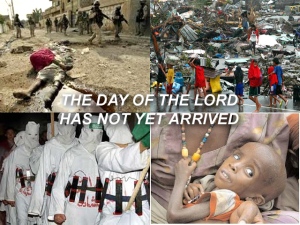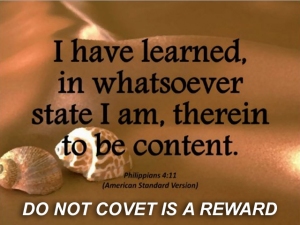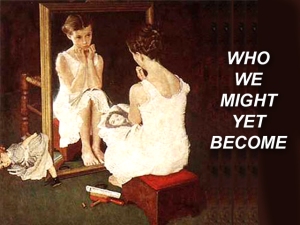Infinite Possibilities
Posted: November 17, 2013 Filed under: Uncategorized Leave a commentInfinite Possibilities
SLIDE 3:
A NEW HEAVEN AND A NEW EARTH
The Hebrew prophets often had to deliver bad news. They seldom died of old age. Jeremiah was stoned to death, Isaiah was sawn in two, Micah was executed by King Jehoram, and Amos was tortured to death by the High Priest Amaziah. Despite the burden of being the bearers of bad tidings, most of the prophets also had visions of better days ahead. Their world was going to hell in a hand basket, but somewhere out there in the future there were good times coming.
Isaiah foresaw a new heaven and a new earth. And in this time to come infant mortality will be all but unknown and no one will die a premature death. Wars of conquest and economic exploitation will disappear. Predators like the wolf and the lion will become vegetarians. And all who seek the Lord will be blessed. The new world of the prophets will be a time of infinite possibilities. And while we haven’t arrived in Beulah Land yet, we might seem to be much closer than in the time of the prophets. Many childhood diseases have been eradicated. Infant mortality is much lower than two-thousand years ago. While we do not enjoy perfect health, average life spans have risen far above the expectations of even one-hundred years ago. In a little over 100 years life expectancy has nearly doubled.
SLIDE 4:
THE DAY OF THE LORD HAS NOT YET ARRIVED
The world does not enjoy perfect peace. Armed struggle has not come to an end, and yet classic wars of conquest are no longer popular. Saddam Hussein was the last national leader to try to invade another country with rather disastrous results for Iraq and himself. The Day of the Lord has not yet arrived, but on a bright clear Fall morning, when I am feeling good, I want to believe that a new day of infinite possibilities may be dawning in the world. We seem to have learned a lesson about invading other countries. Terrorism is still a force to be reckoned with in the world, and the disparity in income distribution between rich and poor is widening. So the Day of the Lord has not yet arrived, but I am still optimistic that a new day of infinite possibilities is growing closer.
SLIDE 5:
ENVY
Perhaps the key human factor with which we struggle as we seek that new day of infinite possibilities is envy. Envy isn’t just the desire to have what other people have it is anger and resentment that other people seem to have something we do not possess. In a recent Still Speaking Devotion Martin Copenhaver pointed out a phenomenon called “Facebook Envy.” Who knew?
A new term has come into common parlance these days: Facebook Envy. Researchers have found, and many people have experienced, that spending time on Facebook can make people more envious. Viewing other peoples’ fabulous vacations, lovely children and great social lives can leave us feeling lonely, frustrated and angry. It is a manifestation of the tendency we have to compare our inside realities with other people’s outer appearances. We are keenly aware of what is really going on in our lives and it cannot measure up to what we see on the surface of others’ lives. Such asymmetrical comparisons can easily stir envy.
SLIDE 6:
WE DON’T USUALLY SHARE OUR DISAPPOINTMENTS
Of course what we do not know is that many of those seemingly happy people we view on-line are really aching inside, depressed, wishing they had someone they could talk to about their real heart hungers, their frustrations, their disappointments. But then we don’t usually share that kind of thing on-line for the whole world to see.
SLIDE 7:
ENVY IS A SMALL TOWN DISEASE
Envying the super rich is not that big a deal. They are too far away to absorb any major damage. Where envy really takes a toll is when we turn it on those who are closest to us. Theologian Soren Kierkegaard called envy a small-town sin because it is a byproduct of living in such close proximity that one is constantly tempted to make invidious comparisons. So, most of us don’t spend much time envying the super rich. Instead, as H.L. Mencken once put it, in America, happiness is making $10 more a month than your brother-in-law.
SLIDE 8:
AFFLUENZA
Envy is the art of counting someone else’s blessings rather than our own. Envy eats away at the fabric of community. Envy is like a spiritual acid. If we are not careful, it will eat away our souls. And our consumer culture feeds our discontent. How many of us need all of the things we go out and buy? We are programmed for desire. Some people have called this affliction of desire “affluenza.” The Buddha taught that desire, our incessant need to possess and our inability to “let go” is the source of human suffering.
SLIDE 9:
OPPOSITE OF ENVY IS GRATITUDE
In this season of Thanksgiving it is interesting to note that the opposite of envy is gratitude. Indeed the antidote for envy is thankfulness for the gifts we have been given — for the gift of life and for the particular life that is ours to live, and gratitude for the unique gifts and talents we have been given. Thank about it. Envy cannot grow in a thankful heart. Envy and gratitude are always competing for our souls. So we can reinforce gratitude in our lives. How?
SLIDE 10:
GRATEFUL LIST
Start by making a list of 10 things for which you are grateful. Our thankful list doesn’t have to be profound. Don’t worry about what other people might think about your list. As the great medieval mystic Meister Eckhart said, “If the only prayer we ever pray is, ‘thank you,’ that will be enough.” Simple things for which we really grateful are what matter — the first light of day, a good night’s sleep, a warm bed, our first cup of coffee in the morning, the taste of breakfast. Simple things for which we choose to be grateful. And if you cannot come up with a list of ten things for which you are grateful, make an appointment to talk with a good spiritual friend. Sometimes another person can help us remember our blessings, when we are depressed and pessimistic.
SLIDE 11:
PRAYING OUR THANKSGIVINGS
Once we have a list of thanksgivings, then we can start praying our thankfulness. Each morning and evening, offer thanks for the items on your list. Each day add new items to your list of thanksgivings. I have noticed lately a number of people posting their thanksgivings on Facebook. As gratitude grows in our lives, envy starts to wither. We can create our own special thanksgiving rituals. Maybe we can use prayer beads to count our blessings, or we could walk the labyrinth and light a candle for each item on our list of thanksgivings. The more we re-enforce our spiritual blessings of gratitude the less room envy has to take root in our lives.
SLIDE 12:
EYES REMADE FOR WONDER
Tomorrow in Bible Study and on Thursday at the Sharing Table we are beginning discussion of Lawrence Kushner’s book Eyes Remade for Wonder. Kushner offers us a very unique perspective on the Biblical form of envy – coveting.
SLIDE 13:
DO NOT COVET IS A REWARD
Rabbi Michal of Zolotchov, intuits that “do not covet” is not a commandment but a reward. If we are content with our portion, we will want nothing and we will lack nothing. It does not mean that we will not . . . change and grow; it means only that at this moment, in this place we are all that we can be. . . Through fulfilling the prohibition against coveting, we have at the same time “heard” the first utterance (of the first commandment) in a new way. To utter the words “I am the Lord your God” is to want nothing else, and strange though it sounds, to want nothing else is the necessary prerequisite for all genuine growth. . . . Growth begins with self-acceptance; change begins with not trying to change. . . .
SLIDE 14:
SELF-ACCEPTANCE BRINGS CHANGE
Thus the goal of all therapy is self-discovery, not the discovery of another self but our true selves. Beneath all the layers of wanting to be different . . . . is a self. This self is a living dynamic force within everyone. And if we could remain still long enough here, now, in this very place, we would discover who we are. And by discovering who we are, we would at last be free to discover who we yet might become.
SLIDE 15:
WHO WE MIGHT YET BECOME
I don’t want to be overly optimistic. As the world is getting better, our ability to mess things up also grows every day. The day of the Lord as foreseen by the prophets has not yet arrived. But I believe if we can become more grateful for the blessings we possess, become more content with who we are and what we have, our eyes will begin to see the infinite possibilities around us. Also, if we can pause and be still long enough to appreciate and accept who we are, we might become free to discover who we might yet become.












Recent Comments